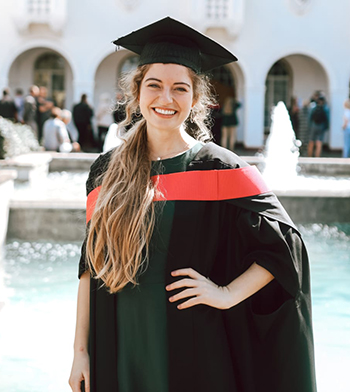North-West University Students Illuminate FameLab Competition with Exceptional Performances
North-West University (NWU) students across diverse disciplines illuminated the stage with their passion for science communication on 19 April 2024.
These students showcased their skills during the NWU’s FameLab competition. FameLab is an international competition designed to engage and entertain by challenging young scientists to communicate their science to a public audience in under three minutes. Participants first compete among their university peers, and then the winners advance to regional and national finals.
Nadia Olivier, a PhD pharmacology student walked away with the spoils. Luciano Willemse, a PhD student from the Faculty of Natural and Agricultural Sciences, was announced the first runner-up, and Tshenolo Masilo, a master’s student also from the Faculty of Natural and Agricultural Sciences, claimed the title of second runner-up.
Nadia’s topic was centred around depression which is the main focus of her PhD study.
“I am passionate about educating the public about mental health, specifically depression, and FameLab is a great opportunity to improve one’s science communication skills,” she says.
Her presentation focused on the large numbers of suicides in South Africa, and the need for new antidepressants that target novel pathways.
“In my PhD studies I am testing a novel antidepressant that targets the butyrylcholinesterase-ghrelin pathway, which is a relatively new target for antidepressant therapy. During my presentation I focused on the complex interplay of ghrelin – the hunger hormone – and depression, and how targeting this pathway has the potential to address the multifaceted pathophysiology of depression,” she explains.
“Taking part in the competition forced me to simplify complex subjects and to convey my research in layman’s terms.”
Luciano says he is grateful for the experience and exposure to present his research in an easily digestible manner. He shared the findings of his research study on evaluating the effect of a high omega-3 diet on a rare disease mouse model.
Tshenolo agrees and says participating in the competition helped her to improve her ability to distil complex research into a concise, three-minute presentation that appealed to non-scientific audiences. “This taught me the value of communicating clearly and demonstrating the relevance of my work.
“My academic background in environmental sciences and biology was extremely useful in explaining the complex interactions between humans and the natural world. By breaking down the science of fish parasites into digestible concepts, I engaged with the audience and made the subject relevant,” she adds.
Tshenolo’s research topic is based on parasite communities of the largescale yellow fish found in the Letaba River in the Limpopo province, a river that has been subjected to human activities such as farming, irrigation and pollution.
The students succeeded in highlighting the depth of scientific expertise within their academic community, while conveying complex ideas with clarity and enthusiasm. These exceptional performances left a lasting impression on both judges and spectators alike.

